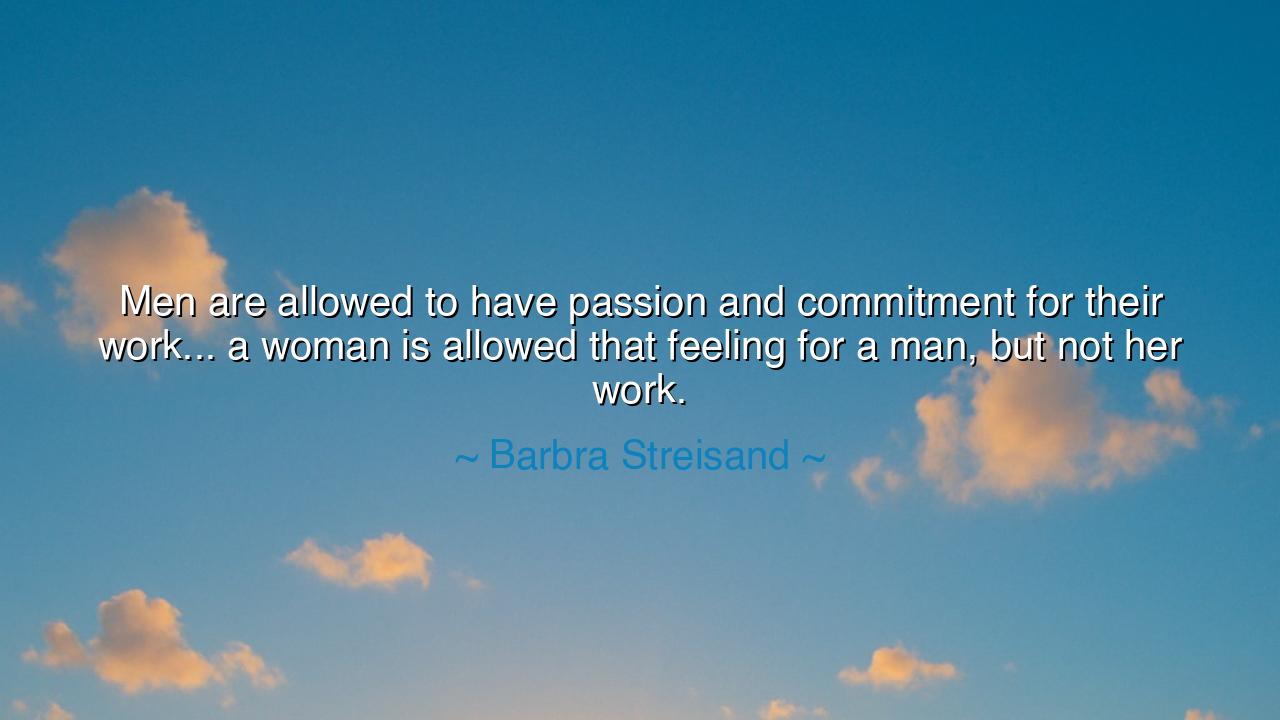
Men are allowed to have passion and commitment for their work...
Men are allowed to have passion and commitment for their work... a woman is allowed that feeling for a man, but not her work.






The words of Barbra Streisand, “Men are allowed to have passion and commitment for their work... a woman is allowed that feeling for a man, but not her work,” strike with the weight of centuries of inequality and the sharpness of truth. She names the double standard that has bound women through the ages: where men are praised for their ambition, women are too often judged for theirs, told that their devotion belongs to love alone, and not to the craft, the art, or the calling that burns within them.
The origin of this injustice lies deep in the structures of patriarchal societies. For countless generations, work was seen as the domain of men, while women were confined to the household, their worth measured by their service to husbands and children. To show passion for a man was celebrated; to show equal fire for labor, invention, or leadership was condemned as unnatural. Streisand, an artist who carved her way through these barriers, speaks as one who knows the price of daring to devote herself to something beyond the narrow path laid before her.
Consider the story of Madame Curie, whose brilliance illuminated the mysteries of radiation. Though she won two Nobel Prizes, she endured scorn and suspicion, her commitment to science treated as unfeminine, her discoveries overshadowed by the myth that only men could bear such genius. Where a man would have been lauded as a hero, she was attacked as a woman who loved her work too much. Yet her persistence proved Streisand’s words: that women who dedicate themselves to labor beyond romance often pay a price men are never asked to pay.
Streisand’s statement also reveals a hidden wound of culture. By allowing men the full breadth of passion—whether for business, art, politics, or invention—society gives them wings. By confining women’s passion to love for a man, society binds them, robbing the world of half its genius. It is not only women who suffer from this injustice, but humanity itself, for it silences voices that could have changed history, painted masterpieces, discovered cures, and led nations.
The lesson is both heroic and urgent: passion is not the property of one sex. To love one’s work is no less noble than to love a man, and to devote one’s soul to creation is no less sacred than to devote it to companionship. To deny women this right is to deny them their full humanity, and to deny the world the fruits of their greatness.
Let the generations remember: true equality is not only the freedom to love whom one will, but the freedom to labor, to dream, to build, and to pour the fire of the heart into any calling. For when women are allowed to embrace their commitment to work as fiercely as men, the world itself is enriched, and humanity rises closer to its full potential.






DPDat Pv
This quote from Streisand made me reflect on the different ways passion is perceived based on gender. Women’s passion for their careers is often seen as secondary or less important than their personal lives, while men are encouraged to focus on their professional goals. How do we dismantle this stereotype and empower women to embrace both their professional and personal passions without being judged for it?
QVKim Pham Quoc Viet
Barbra Streisand’s observation is a powerful critique of the way society views women's passions. It seems that women’s career ambitions are often downplayed or disregarded, while their personal lives are scrutinized more intensely. How can we create an environment where women are not only allowed but encouraged to have a strong commitment to their work? What steps can we take to ensure that women are fully supported in pursuing their passions without judgment?
BTBao tram
This quote from Streisand is a stark reminder of how gender biases still shape our perceptions of passion and dedication. Women are often labeled as 'too ambitious' or 'unfeminine' if they prioritize their careers, while men are encouraged to do so. How do we shift the cultural mindset that limits women to a narrow definition of success, focusing only on relationships rather than on their professional contributions and aspirations?
D107 Ha Van Dung 10A2
Streisand’s quote speaks to a larger issue of societal expectations and gender roles. Why is it that men are celebrated for their passion for work, while women are expected to express their passion primarily for relationships? Can we ever truly break free from these stereotypes, or are they so deeply ingrained that it’ll take generations to change? How do we ensure that women’s passions for their careers are equally recognized and valued?
HTTran Huyen Trang
Barbra Streisand’s statement highlights the double standard that still exists between men and women when it comes to passion and commitment in their work. It’s frustrating to think that women are often expected to prioritize relationships over their careers, while men are allowed to fully invest in their work. How do we challenge and change this narrative, especially when women are just as passionate and driven in their professional lives?